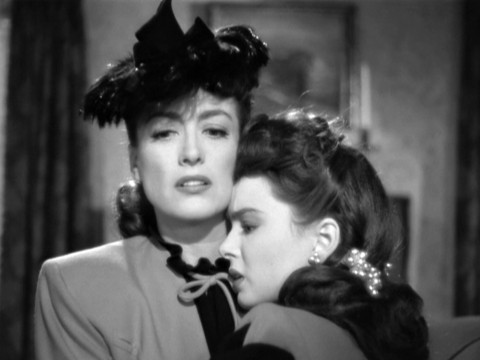 Watch "Mildred Pierce." Look at Joan Crawford's face. It is a mask of worried curiosity, of closely guarded openness; her large almond eyes wide open and searching, mouth and cheeks drawn and fixed, as if bracing for what she might find. Even when she reluctantly allows herself a brief, warm smile she then almost immediately withdraws, becomes distant and hard, as if even that small intimacy were a dangerous indulgence. Her body often rests in close proximity to other characters, but her rigid torso and sharp, broad shoulders are almost always inclined away. For me, any understanding of "Mildred Pierce" begins with this shuddering dance. Crawford physically isolates herself, makes herself harder to love. Was there ever a female movie star who so willfully resisted the audience's affections? Why would she do that?
Watch "Mildred Pierce." Look at Joan Crawford's face. It is a mask of worried curiosity, of closely guarded openness; her large almond eyes wide open and searching, mouth and cheeks drawn and fixed, as if bracing for what she might find. Even when she reluctantly allows herself a brief, warm smile she then almost immediately withdraws, becomes distant and hard, as if even that small intimacy were a dangerous indulgence. Her body often rests in close proximity to other characters, but her rigid torso and sharp, broad shoulders are almost always inclined away. For me, any understanding of "Mildred Pierce" begins with this shuddering dance. Crawford physically isolates herself, makes herself harder to love. Was there ever a female movie star who so willfully resisted the audience's affections? Why would she do that?* * *
The film opens with the dissolution of Mildred's first marriage, a relationship ruined by financial strain, contemptuous bickering and infidelity. For many (and for men in particular) the end of an unhappy marriage might be viewed as a way to freedom, to spiritual or sexual self-actualization. But we can tell from Mildred's defiant but deeply worried expression that she understands her new life as a field of exposure and risk. Now she is vulnerable financially; she is exposed to the the sexual advances of Wally Fay, her husband's predatory former business partner; she is defenseless in an exploitive, unpredictable world.
Mildred's solution to her woes is somewhat hilariously simple. In true film noir fashion, intention almost instantaneously becomes action. Mildred decides that she wants to open a restaurant and become wealthy and almost immediately does so. Problem solved. On another level, though, there is something stark and terrifying, but also rather ingenious at work.
Mildred begins to mediate all of her relationships with contractual agreements and with money. She enters into a business partnership with the insatiable Wally and into a contractual one with Monte Baragon, her dissolutely aristocratic new love interest. Above all, she uses money--to solidify her relationships, to ensure her own security, to reconstitute her dissolving family. In other words, Mildred has commodified her relationships. This is her hedge against the violence and instability of single womanhood in a paternalistic world. This strategy proves pretty successful for her (until it doesn't) but it comes with some serious costs; these are played out most gruesomely in Mildred's relationship to her oldest daughter, the ironically named Veda (pronounced veedah like the Spanish word for 'life').
Mildred has had to teach herself, with great sorrow, how to operate in such a cold, unforgiving place but for Veda it all comes naturally; she was born into it. For her, personal relationships are entirely transactional, contracts to be negotiated and won. She takes great satisfaction in her own aristocratic selfishness; she cruelly manipulates other characters into satisfying her tremendous material desires. She is a monster. (It is in the character of Veda, too, that a narrative of post-depression class anxiety plays itself out. Underneath Veda's crass, aspirational materialism is a paranoia of work and the privations and fleshy indignity that accompany it.)
 Mildred knows all this about Veda but can't stop loving her anyway. Mildred goes to absurd lengths to buy Veda's loyalty and love. She seems to know that with every material indulgence their relationship becomes more coldly transactional and less human, but she sees it as her only hope for wooing such a venal child. This is the tragedy of "Mildred Pierce": Mildred craves authentic human relationships but the more she plays by the rules, the more she commodifies her life, the more she forecloses the possibility of those relationships.
Mildred knows all this about Veda but can't stop loving her anyway. Mildred goes to absurd lengths to buy Veda's loyalty and love. She seems to know that with every material indulgence their relationship becomes more coldly transactional and less human, but she sees it as her only hope for wooing such a venal child. This is the tragedy of "Mildred Pierce": Mildred craves authentic human relationships but the more she plays by the rules, the more she commodifies her life, the more she forecloses the possibility of those relationships.Thus, Crawford's contorted posture and her torturously restrained facial expressions. In Crawford's body we see a matrix of openness, longing and withdrawn self-protection. Her human instincts pull her toward intimacy, but she just as instinctively understands two things: first, that intimacy invites danger and second, that it has been replaced by contractual exchange. As Don Draper tells Peggy when she demands to be shown a modicum of gratitude for her hard work and creativity, "that's what the money's for."

